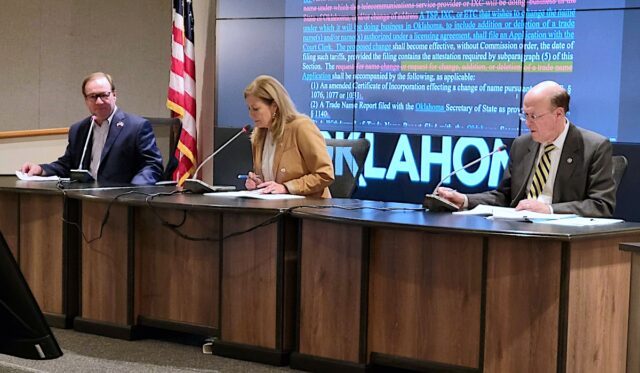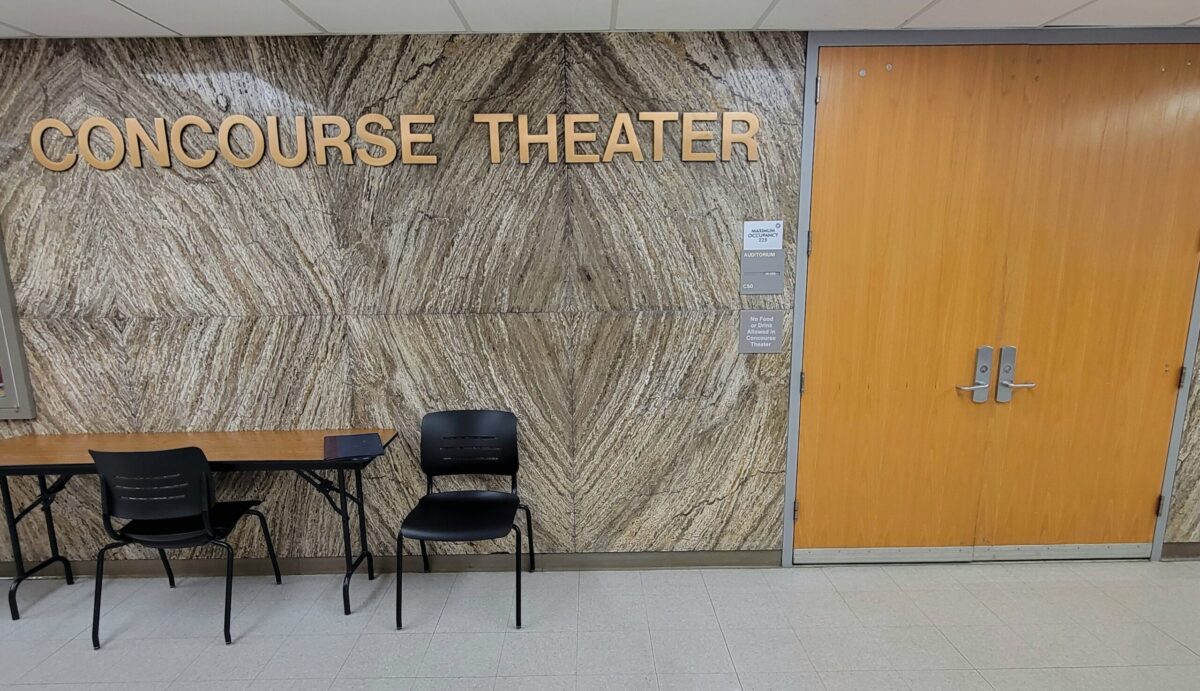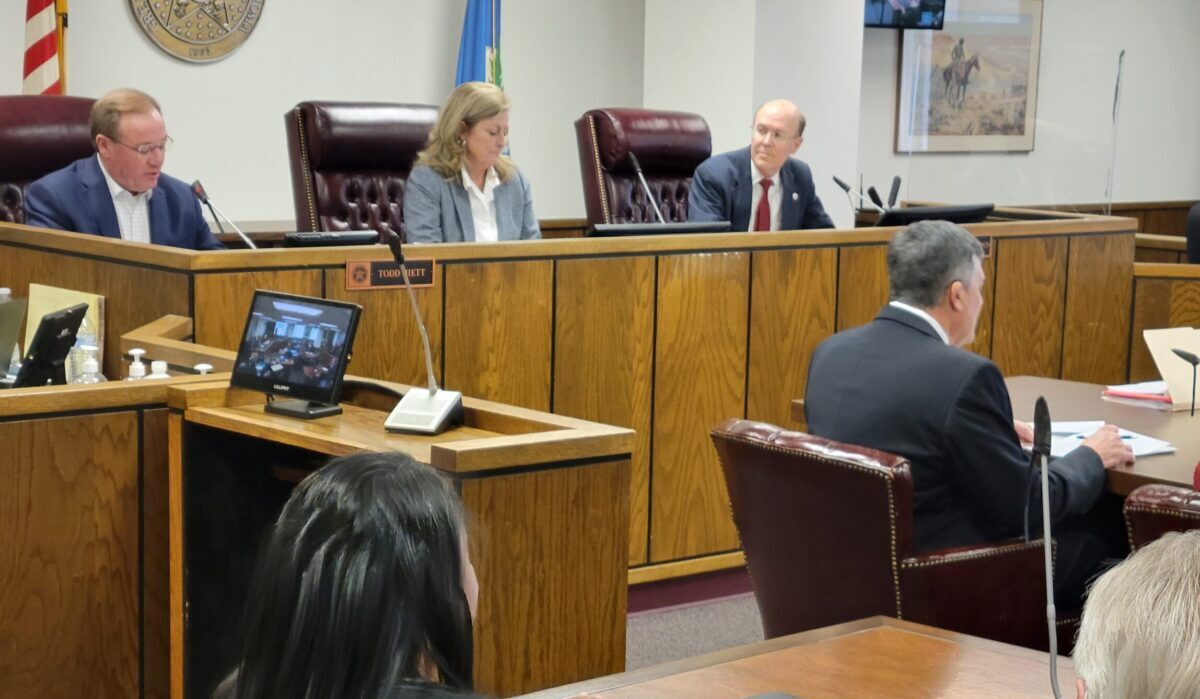

(Update: HB 2367 regarding Corporation Commission conversations advanced from the Senate Energy and Telecommunications Committee on a 10-1 vote Thursday, April 4. The following article remains in its original form.)
If a division director of the Oklahoma Corporation Commission wants to talk to members on the three-person governing body about internal operations or a pressing item, a meeting has to be scheduled with each elected official individually. Meeting with more than one commissioner at the same time without posting a notice of a public meeting constitutes a violation of the state’s Open Meeting Act.
A measure set for consideration Thursday in the Senate Energy and Telecommunications Committee would ease some restrictions that the three-member commission faces in trying to deal with agency matters without removing requirements that any discussions or action on pending rate increases or other proposals must take place in a public meeting.
House Bill 2367 by Rep. Tammy Townley (R-Ardmore) would allow the three members of the Corporation Commission to gather and have discussions — but not take formal votes — on certain matters. Currently, two of the members cannot discuss administrative actions or certain issues pending before the commission without violating the Open Meeting Act.
“They run so inefficiently. They play what I like to call a game of juvenile telephone over there,” Townley said. “They’ve got their aides, and the aides — one goes and talks to one commissioner, the other goes and talks to another commissioner. And the commissioners can’t actually talk until they get into session.”
While Townley said the Corporation Commission asked her to run the bill this year, she also has a family member with concerns about how the agency operates. Her uncle, Hamp Baker, served two terms as an elected corporation commissioner from 1974 to 1986.
“He thinks the way they do it now is very inefficient,” Townley said.
Language added to the bill before it passed the House of Representatives states that corporation commissioners would still not be allowed to discuss pending “legislative” matters, which refer to rate cases and other proposals by regulated utilities, without complying with the Open Meeting Act.
But HB 2367 would partially exempt the commission from the Open Meeting Act so that at least two commissioners could discuss administrative, operational and procedural matters — provided the discussions do not address appropriation of commission funds and no official action is taken.
Such matters would be limited to:
- Scheduling of agenda items to be set before the Corporation Commission for an emergency, regular or special meeting;
- Prioritizing cases pending before the Corporation Commission;
- Identifying legislative changes, proposed or passed, and their effects on the Corporation Commission;
- Discussing public and media statements;
- Discussing staffing needs;
- Receiving information updates from Corporation Commission staff on agency business, as long as such updates do not pertain to pending rate proceedings of the commission;
- Conducting regular staff meetings where discussions of the day-to-day management of the Corporation Commission occurs, as long as such updates do not pertain to pending rate proceedings of the commission;
- Interviewing potential employees for the position of director of administration and division directors; and
- Assessing performance reviews and duties of the director of administration and division directors.
According to HB 2367, corporation commissioners would also be able to attend and participate in conferences, trainings, education, press and social events where the topic is the Corporation Commission, even if a quorum is present, provided that no official action is taken and any discussion of the business of the Corporation Commission is incidental to the event.
In Oklahoma, the three commissioners are elected statewide to six-year terms, meaning one seat is up for consideration every election year.
Oklahoma Press Association has been working on HB 2367

Carried by Sen. Dave Rader (R-Tulsa) in the Senate, Townley’s measure would require the Corporation Commission to post on its website information on what was discussed during the conversations or events allowed in the bill. Commissioners would have to post the information within five business days after the meeting or event. If commissioners decide to take formal action on a topic that was discussed, then they must provide at least 48 hours notice before considering such an item at a public meeting.
Commission Chairman Todd Hiett said during a Feb. 20 special meeting to discuss HB 2367 that he has worked with the Oklahoma Press Association the past five years to deal with difficulties faced by a three-member commission that needs to discuss matters and still comply with the Open Meeting Act.
“We all understand the Open Meeting Act and the importance of the Open Meeting Act, but it creates with a three-member board a situation (…) that’s just untenable much of the time,” he said.
Currently, Hiett said leaders within the agency must schedule meetings with each commissioner individually.
“This bill would open the door to allow for a joint briefing provided the commissioners are not (…) taking any action,” he said.
Mark Thomas, executive director of the OPA, told NonDoc on March 18 that the legislation is an attempt to deal specifically with the inefficiencies of the three-member Corporation Commission. HB 2367 deals strictly with the Corporation Commission and not any other three-member entity, such as the Oklahoma Workers’ Compensation Commission, Oklahoma Tax Commission or boards of county commissioners. HB 2367 amends language in Title 17, which deals with the Corporation Commission, and it does not involve Title 25, Chapter 8, Sections 301 to 314, which defines the Open Meeting Act.
“Eventually, other three-person boards are going to want something like that, and you want to find something that works, that’s transparent,” Thomas said.
OPA has not taken a position on HB 2367 because Thomas said it remains a work in progress. Still, he said he appreciates the effort to deal with the awkwardness of a three-member body trying to take care of matters in a timely manner while still complying with the Open Meeting Act.
An opinion by then-Attorney General Scott Pruitt in 2012 created some uncertainty on how corporation commissioners could operate as a three-member board and still comply with the Open Meeting Act, Thomas said. It basically said two of the commissioners could not talk on matters that are discreet proposals that are going to come before the Corporation Commission for a vote.
“What that means, kind of in the opposite, is they could talk about things that were not discreet proposals that weren’t going to come to them before a vote, as far as they knew,” he said.
The issue came up again in 2017 when then-Gov. Mary Fallin formed the Second Century Commission Task Force to find ways to improve efficiency at the agency. In the task force’s report, recommendations included either expanding the Corporation Commission should to a five-person board or relaxing some of the rules of the Open Meeting Act for the Corporation Commission.
“The other option of switching to a five-member board sounds better to people, but at that point, two commissioners could talk to each other as long as there weren’t three in the room together, and there would be no transparency,” Thomas said.
During the Feb. 20 special meeting, Hiett and Corporation Commissioner Kim David voted to support the measure, provided it allowed limited exceptions that were approved by the OPA. Corporation Commissioner Bob Anthony said he would not participate in the vote.
Hiett said if the Oklahoma Press Association determined it could not support HB 2367, “that would cause me to withdraw my support and (I) would announce so publicly.”
David said HB 2367 would make the commissioners more efficient, noting that currently if a commissioner wants to talk with a legislator about pending legislation, the commissioner has to schedule to meet individually with lawmakers.
“You know, we’re in a little different situation than say county commissioners who have a dedicated district that they oversee,” she said. “We are three commissioners that are overseeing the same district, which is statewide.”
Hiett said after the meeting that HB 2367 would make the Corporation Commission more efficient and allow the commissioners to properly administer the agency without having to go through the process of posting public meetings whenever at least two commissioners met. Those discussions, he said, would deal mostly with agency operations and procedures.
“My intent is that these are not the issues that would impact the consumers,” he said. “Obviously, no action could be taken, but that would have to be disclosed so the public would have access to it, and maybe even more readily than they would (now) because a lot of times, you know, the public’s at work, they don’t hear what we say here. But in this case, they could just go to the website and see what discussions have occurred.”
‘If this is a bad idea, it goes away in two years’

Since the Corporation Commission’s Feb. 20 special hearing to discuss HB 2367, Anthony has come out against the measure in a recent commentary.
“It is yet another lash across the eyes of those legitimately attempting to peek behind the curtain and find out exactly how and why consumers have received such short shrift at the commission in recent years while the insiders and special interests seem to get their way time and time again,” he wrote.
Anthony said he considers HB 2367 as an attempt “to slam the lid and nail shut the coffin that the Corporation Commission has attempted to build” regarding what he insists is a “very costly coverup” regarding 2021 Winter Storm Uri profiteering and bailouts at the expense of Oklahoma ratepayers.
Anthony, who has been a commissioner for 35 years and is the longest-serving elected statewide official in Oklahoma history, said that during his first decade in office, commissioners met daily, Monday through Friday, in posted, open, regular public meetings with recorded votes. Even 10 years ago, the commission still averaged more than three posted, open, regular public meetings each week. But last year, he said, the commission averaged less than one public meeting per week, at which commissioners conducted business and voted on orders.
“Personally, I believe the activities, meetings and records of the Oklahoma Corporation Commission and its individual commissioners deserve more, not less, scrutiny by the public, the news media, the state auditor, the Legislature, and anyone else,” he wrote in his commentary.
Term limits are forcing Anthony to retire at the end of this year.
The House Energy and Resources Committee voted 13-0 on Feb. 28 to advanced HB 2367. It received lukewarm support in the House, passing 54-32 on March 14, the last day it could meet a legislative deadline to remain alive this session.
HB 2367 would take effect Nov. 1. The version set for consideration Thursday in the Senate Energy and Telecommunications Committee includes a sunset provision that would expire July 1, 2026.
Townley praised Thomas for that idea.
“Let’s see if we can make it work, and if it doesn’t work, well, we tried,” she said.
Thomas agreed.
“You have the 2025 session to tinker with it, the 2026 session to tinker with it or it goes away,” Thomas said. “It’s not automatically renewed. It ends unless the Legislature reauthorizes. If this is a bad idea, it goes away in two years.”




















